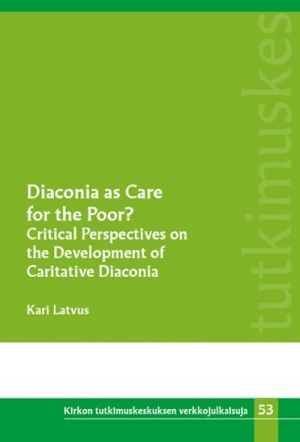Critical Perspectives on the Development of Caritative Diaconia
Diaconia is currently highly appreciated globally and is a necessary action of the churches. Awareness of the reality of the every day life of people living in poverty and their needs as well as the active response of churches underlines the social aspect of Christianity. However, there is also a growing need to clarify what the words diaconia and deacons actually meant in the early church and how those words can be used properly nowadays.
This study brings together important strands in the recent study of what have been called the 'diaconia words,' in the New Testament and the Christian tradition. Questions about diaconia words and terms are connected in this study with care of the poor. Also the story of deacons, their origin and the development of this office are analyzed.
Latvus points out that the reformation's 'return to the roots of diaconia' and the subsequent developments in the 19th century were marred by a misunderstanding. It seems that recent research findings threaten the carefully built up identity of modern diaconia and the role of the deacon in social engagement. The present study invites us to face up to this challenge squarely and looks for a positive understanding and development of diaconia.
The author of the work, Kari Latvus, is both a biblical scholar and a diaconia oriented Lutheran pastor. Dr. Latvus is a senior advisor in the Worship and Society Unit at the National Church Council, Helsinki, Finland, and he is also an adjunct professor at the University of Helsinki.
Critical Perspectives on the Development of Caritative Diaconia
Diaconia is currently highly appreciated globally and is a necessary action of the churches. Awareness of the reality of the every day life of people living in poverty and their needs as well as the active response of churches underlines the social aspect of Christianity. However, there is also a growing need to clarify what the words diaconia and deacons actually meant in the early church and how those words can be used properly nowadays.
This study brings together important strands in the recent study of what have been called the 'diaconia words,' in the New Testament and the Christian tradition. Questions about diaconia words and terms are connected in this study with care of the poor. Also the story of deacons, their origin and the development of this office are analyzed.
Latvus points out that the reformation's 'return to the roots of diaconia' and the subsequent developments in the 19th century were marred by a misunderstanding. It seems that recent research findings threaten the carefully built up identity of modern diaconia and the role of the deacon in social engagement. The present study invites us to face up to this challenge squarely and looks for a positive understanding and development of diaconia.
The author of the work, Kari Latvus, is both a biblical scholar and a diaconia oriented Lutheran pastor. Dr. Latvus is a senior advisor in the Worship and Society Unit at the National Church Council, Helsinki, Finland, and he is also an adjunct professor at the University of Helsinki.













